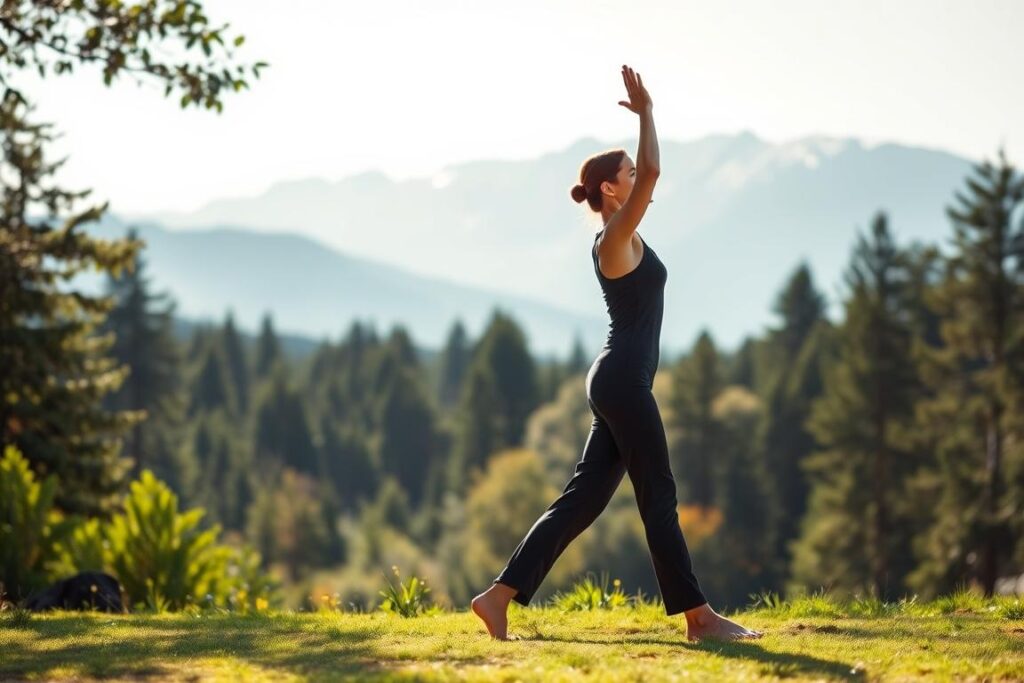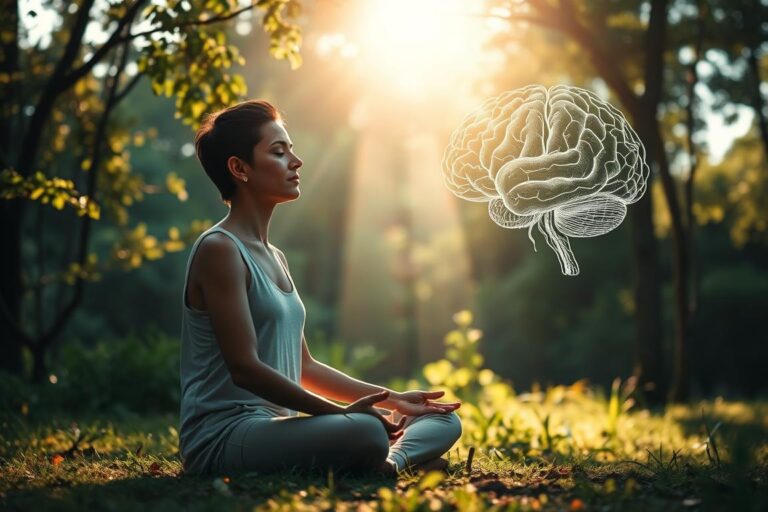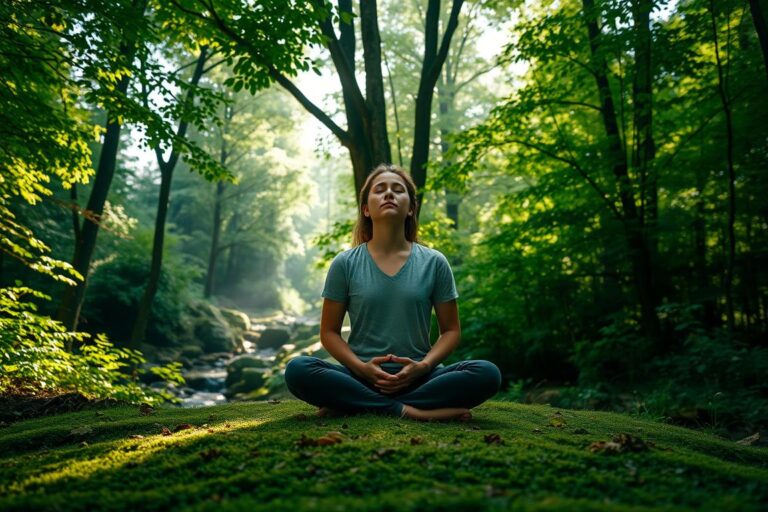Meditation for stress, anxiety & sleep problems: How and why it works
Almost one in two people in Germany suffers from stress and anxiety. The consequences are sleep problems, reduced performance and a reduced quality of life. But what if you knew a simple but effective method to overcome these problems?
Meditation is an ancient practice that is more relevant today than ever. Through regular meditation, you can strengthen your mental resilience and overcome anxiety. In this guide, you will learn how to integrate meditation into your everyday life to reduce stress and anxiety and improve your quality of life.
Important findings
- Find out how meditation can reduce stress and anxiety.
- Learn how to integrate meditation into your everyday life.
- Discover the benefits of regular meditation practice.
- Find out how meditation can strengthen your mental resilience.
- Find out how you can find inner peace through meditation.
What is meditation? More than just sitting still
Meditation is more than just sitting still; it is a practice that promotes inner peace and mindfulness. Through meditation, you can learn to better understand and control your thoughts and feelings.
The meaning and origin of meditation
Meditation has its roots in various religious and spiritual traditions, such as Buddhism, Islam and Christianity. It not only serves spiritual enlightenment, but can also be used as a tool for personal development and stress reduction.
Overview of different forms of meditation
There are various forms of meditation that you can try out. These include contemplative and active meditation. Mindfulness meditation helps you to stay in the moment, while concentration meditation calms your mind. Active forms such as walking meditation or tai chi allow you to achieve meditative states through movement.
Meditation for stress & anxiety: the scientific basis
Meditation can reduce your anxiety and stress to a minimum, as numerous studies have shown. Science has extensively researched the positive effects of meditation on the brain and psyche.
How meditation changes the brain
Meditation influences the brain in many ways. It can reduce activity in the regions associated with anxiety and stress. Regular meditation helps to strengthen resilience to anxiety disorders.
Studies on efficacy in anxiety disorders
Numerous studies have investigated the effectiveness of meditation in alleviating anxiety disorders. One study showed that an eight-week MBSR program could reduce the symptoms of anxiety disorders by up to 50%. Meditation helps with anxiety and can have long-term positive effects.
You can manage your anxiety and improve your quality of life through meditation. Research shows that meditation is not a fringe alternative method, but a scientifically recognized intervention.
Why meditation helps with sleep problems
If you have difficulty falling asleep, meditation can be a valuable aid. By consciously controlling your attention, you can ‘switch off’ fears, worries and musings for a while and cultivate a state of inner peace.
The connection between stress and sleep disorders
Stress and anxiety are common causes of sleep disorders. When you’re under stress, your body can struggle to calm down. Meditation can help here by activating your parasympathetic nervous system and putting your body into ‘rest-and-digest’ mode.
How regular meditation improves your sleep
Through regular meditation, you can learn to calm your thoughts and achieve a state of inner peace. This can help you to fall asleep more easily and sleep better through the night. Studies have shown that people who meditate regularly enjoy a better quality of sleep, with more deep sleep phases and fewer night-time awakenings.
Finding the right meditation posture
To meditate effectively, you need to find a posture in which your body is relaxed and you can concentrate fully on the meditation. The main thing is that you are sitting comfortably so that you can focus your attention inwards.
Classic sitting postures for meditation
Classic sitting postures such as the lotus position or the half lotus position have traditionally been used for meditation. These postures promote an upright posture and can help to stabilize the body. When meditating in these positions, it is important that you keep your back straight and position your feet accordingly to find a stable form.
Alternatives for people with physical disabilities
If you have physical limitations, there are alternative meditation postures you can try. Sitting on a chair with your back straight and your feet flat on the floor is a good option. Alternatively, you can also meditate lying down, for example in the Shavasana position, which relieves pressure on the back and body. It is important to create a space in which you feel comfortable and can meditate undisturbed.
Breathing meditation: your basic technique against anxiety
One of the simplest and most effective methods of overcoming anxiety is breathing meditation. This technique helps you to control your breathing and thus reduce your anxiety.
Step-by-step instructions for breathing meditation
To start the breathing meditation, find a quiet and comfortable sitting position. Close your eyes and concentrate on your breathing. Breathe in and out deeply and try to let go of your thoughts. You can do pranayama (breathing exercises) if you want to calm down.
When and how often you should practise
Start with 5-10 minutes of daily practice, ideally at a fixed time, to establish a routine. If you have acute anxiety, you can do a short breathing meditation at any time. As you gain experience, you can gradually extend the duration to 15-20 minutes or longer. Integrate mini meditations into your everyday life to bring more serenity into your life.
Active forms of meditation for restless spirits
For people with a restless mind, there are active forms of meditation that help to integrate meditation into everyday life.
Walking meditation: meditation in motion
Walking meditation is a form of meditation in which you are in motion. You concentrate on your steps and your surroundings. This can help to train your attention and reduce anxiety.

Meditative everyday activities
Almost any everyday activity can become a meditative exercise if you do it with full attention and presence. When cooking, you can concentrate on cutting, stirring and the various sensory impressions. Creative activities such as painting or drawing can also promote a meditative state.
By integrating meditation into your everyday life, you can reduce your anxiety and improve your quality of life.
Guided meditations against acute anxiety

In moments of acute anxiety, a guided meditation can help you to calm down. Guided meditations are a great way to overcome your anxiety and find inner peace.
Short meditations for emergency situations
Short, focused meditations are particularly helpful in situations where anxiety and panic occur acutely. These can be carried out quickly and easily to provide immediate relief.
Resources for guided meditations
Wondering where to find quality guided meditations for anxiety and panic? There are a wealth of resources available today to help you get started with meditation practice.
Meditation apps such as Headspace, Calm or 7Mind offer specially curated programs against anxiety and restlessness with guided meditations of different lengths and for different situations.
You can find numerous free guided meditations against anxiety and panic on YouTube. Look out for channels with professional speakers and positive reviews to find high-quality content.
Mindfulness-based stress reduction (MBSR)
If you suffer from stress and anxiety, Mindfulness-Based Stress Reduction (MBSR) could be a helpful solution for you. MBSR is a program that combines meditation and other exercises to strengthen your ability to cope with stress.
What is MBSR and how does it work?
MBSR is an evidence-based program that aims to increase your mindfulness in everyday life. Through meditation and yoga, you can learn to better manage your anxiety and restlessness.
MBSR exercises for everyday life
You can integrate some MBSR exercises into your everyday life without attending a full course. The body scan, an exercise in which you direct your attention through your body, helps you to release body tension. Sitting meditation with a focus on the breath strengthens your ability to stay in the present moment. Other exercises such as mindful eating, walking and communicating bring more presence into your everyday life and can be particularly helpful for generalized anxiety disorder.
Integrate meditation into your everyday life: Practical tips
To successfully integrate meditation into your everyday life, it is important to develop a routine. This will help you to meditate regularly and reap the full benefits of meditation.
Establish a meditation routine
Start by choosing a fixed time and place for your meditation. Even 5 minutes of meditation a day can have a positive effect. Experiment with different meditations to find out what works best for you.
Overcoming obstacles and sticking with it
You will inevitably encounter obstacles on your meditation path. If your mind keeps wandering during meditation, this is not a sign of failure, but a normal part of the process. If you experience persistent restlessness or anxiety, it can be helpful to start with shorter sessions or switch to more active forms of meditation such as walking meditation.
Seek support from a meditation group or an app with a reminder function to increase your motivation.
Conclusion: Your path to more inner peace through regular meditation
The practice of meditation helps you to cultivate your inner peace. Through regular practice, you can learn to let go of your fears and go through life more calmly. Meditation does not replace psychotherapy, but it does help you to regulate your tension and counteract stress.
You now have a comprehensive overview of the different forms of meditation and their benefits. Now it’s up to you to apply these tools in your everyday life. Remember that patience and perseverance are your most important companions on this path.
The scientific evidence is clear: regular meditation helps to reduce anxiety and improve sleep quality. Start with small steps and find the forms of meditation that suit you. Meditation will become a natural part of your life, helping you to cultivate inner peace and serenity.




